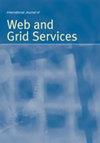Q-PD:在链接开放数据上使用基于谓词的RDF的查询图扩展框架
IF 1
4区 计算机科学
Q4 COMPUTER SCIENCE, INFORMATION SYSTEMS
International Journal of Web and Grid Services
Pub Date : 2020-06-23
DOI:10.1504/ijwgs.2020.10030142
引用次数: 1
摘要
链接开放数据(LOD)作为一种共享和整合网络资源和物理资源信息的新平台而出现。然而,随着LOD数量的爆炸式增长,查询LOD以发现高质量信息变得困难。为了从LOD中获得所需的信息,我们提出了查询图扩展框架(Q-PD框架),该框架可以扩展用户的查询。为此,Q-PD框架识别实体图(EG),其中包含与用户查询直接相关的LOD资源。接下来,它执行基于谓词的RDF聚类来查找主题图模式(tgp),这些模式是要用关于特定主题的信息重新构造的eg。最后,Q-PD框架使用tgp扩展了与用户查询相关的RDF图模式。为了证明Q-PD框架的卓越性,我们对从DBpedia中收集的681.9个实体和51,577.1个RDF三元组进行了三种实验。实验结果表明,Q-PD框架在完整性和准确性方面都优于现有的自底向上方法。本文章由计算机程序翻译,如有差异,请以英文原文为准。
Q-PD: query graph extension framework using predicate-based RDF on linked open data
Linked open data (LOD) has emerged as a new platform for sharing and integrating information about not only web resources but also physical resources. However, as the volume of LOD increases explosively, it becomes difficult to query the LOD to discover the high-quality information. To obtain the desired information from the LOD, we propose the query graph extension framework (Q-PD framework) that can extend the users' queries. To do so, the Q-PD framework identifies the entity graph (EG), which contain the LOD resources directly related to the users' queries. As a next, it performs predicate-based RDF clustering to find the topic graph patterns (TGPs), which are the EGs to be reconstituted with information on the specific topics. Finally, the Q-PD framework extends the RDF graph patterns related to the users' queries using the TGPs. To prove the excellence of the Q-PD framework, we performed the three kinds of experiment with 681.9 entities and 51,577.1 RDF triples collected from DBpedia. Experimental results show that the Q-PD framework is superior to the existing bottom-up approach in terms of completeness and accuracy.
求助全文
通过发布文献求助,成功后即可免费获取论文全文。
去求助
来源期刊

International Journal of Web and Grid Services
COMPUTER SCIENCE, INFORMATION SYSTEMS-COMPUTER SCIENCE, SOFTWARE ENGINEERING
CiteScore
2.40
自引率
20.00%
发文量
24
审稿时长
12 months
期刊介绍:
Web services are providing declarative interfaces to services offered by systems on the Internet, including messaging protocols, standard interfaces, directory services, as well as security layers, for efficient/effective business application integration. Grid computing has emerged as a global platform to support organisations for coordinated sharing of distributed data, applications, and processes. It has also started to leverage web services to define standard interfaces for business services. IJWGS addresses web and grid service technology, emphasising issues of architecture, implementation, and standardisation.
 求助内容:
求助内容: 应助结果提醒方式:
应助结果提醒方式:


